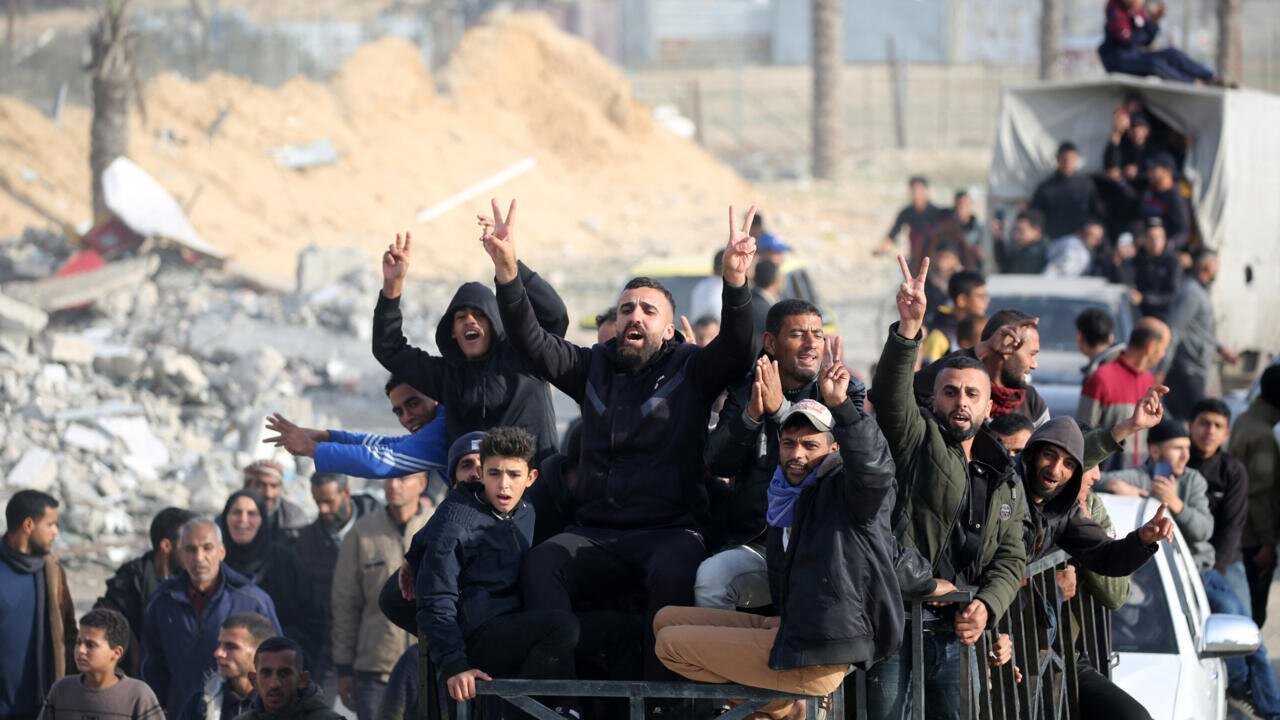VICTORY on the 470th day
The first phase of Gaza ceasefire begins as Hamas releases 3 captives and 90 Palestinian prisoners walk free from Israeli jails

TEHRAN - The initiation of a ceasefire between Israel and Hamas clearly indicates that the regime’s war ambitions in Gaza have gone down in flames.
The ceasefire went into effect on Sunday following 470 days of relentless Israeli strikes in the besieged Palestinian territory.
It was implemented after a delay of almost three hours during which Israeli forces killed nearly 20 Palestinians and injured dozens of others.
Prime Minister Benjamin Netanyahu had earlier accused Hamas of not living up to its commitment to provide the names of the three captives who were set to be freed in exchange for dozens of Palestinian prisoners.
Later on Sunday, Hamas released the three captives as 90 Palestinian prisoners walked free from Israeli jails.
The truce will be implemented in three phases. The six-week initial phase includes the gradual withdrawal of Israeli forces from central Gaza and the return of displaced Palestinians to northern Gaza.
The deal should ultimately lead to the complete withdrawal of Israeli forces from Gaza, alongside the release of captives in return for the freedom of hundreds of Palestinians from the regime’s jails. The agreement is also anticipated to result in a surge of humanitarian aid to the enclave.
Since launching its war of genocide on Gaza on October 7, 2023, Netanyahu had repeatedly promised to destroy Hamas and secure the release of captives. However, the Israeli army failed to do so after more than 15 months of war that claimed the lives of more than 46,900 Palestinians, including up to 18,000 children. Over 110,000 Palestinians were also injured during the course of the war.
The fatalities are believed to be higher than the figures announced by the Health Ministry in Gaza. This is because thousands of missing Palestinians are trapped beneath the rubble of destroyed buildings and buried in unmarked graves.
Israel committed back-to-back massacres in Gaza. It not only pounded civilian infrastructure but also bombed and stormed hospitals where patients and displaced people had taken refuge.
The regime also stands accused of starving Palestinians to death by obstructing the delivery of humanitarian aid to the Gaza Strip, particularly to the north of the enclave.
The Israeli war of genocide began shortly after Hamas carried out a surprise military operation in southern Israel dubbed the Al-Aqsa Storm. More than 1,100 people were killed and about 250 others were taken captive during the operation. All the remaining captives held in Gaza will be freed if Israel complies with the terms of the ceasefire.
Israel threw in the towel by agreeing to the truce after its dreams of defeating Hamas turned into a nightmare.
On Friday, an Israeli think tank acknowledged that Netanyahu and his allies have shot themselves in the foot by prolonging the war. “The implications of the agreement (ceasefire) are clear: Israel will not bring about the “collapse” of Hamas because it has never been able to do so,” the Israeli Institute for National Security Studies (INSS) said.
It noted that Netanyahu prolonged the Gaza war for “personal survival and short-sightedness”, which “has cost the lives of more Israelis soldiers and more captives”.
More than 800 Israeli troops have been killed since the Al-Aqsa Storm was launched. This includes 400 soldiers who lost their lives since the Israeli army began a ground incursion into Gaza in late October 2023.
The INSS also admitted that Israeli crimes in Gaza have deepened the regime’s international isolation.
In addition to seeing a substantial erosion of its international standing, Israel’s inability to meet its war objectives has deepened domestic rifts.
Protests against Netanyahu’s failed military strategy in Gaza had become a regular occurrence in Israeli cities since the onset of the onslaught.
The abortive military actions also led to high-profile resignations among Israeli military and security officials.
Netanyahu accepted the ceasefire because he had no other option as people in Gaza stuck together through thick and thin.
Nonetheless, Netanyahu’s hardline allies gnashed their teeth about his decision to acquiesce to the truce agreement.
On Sunday, far-right National Security Minister Itamar Ben Gvir resigned from Netanyahu's coalition cabinet, along with other members of his party, as the ceasefire took effect.
Otzma Yehudit party had already threatened to bolt the coalition if Israel agreed to the truce deal with Hamas.
The party said the ceasefire agreement amounts to “a surrender” to Hamas and constitutes a “complete victory” for the group.
Heritage Minister Amichai Eliyahu is among those who submitted his resignation.
Eliyahu had said in November 2023 that one of Israel’s options in the war against Hamas could be to drop a nuclear bomb on the Gaza Strip.
Neither the threat of nuking Gaza nor conducting brutal strikes could bring Palestinians to their knees.
Presently, Israel’s military failure in the Gaza war is the elephant in the room which has pit the regime’s officials against each other.
Leave a Comment